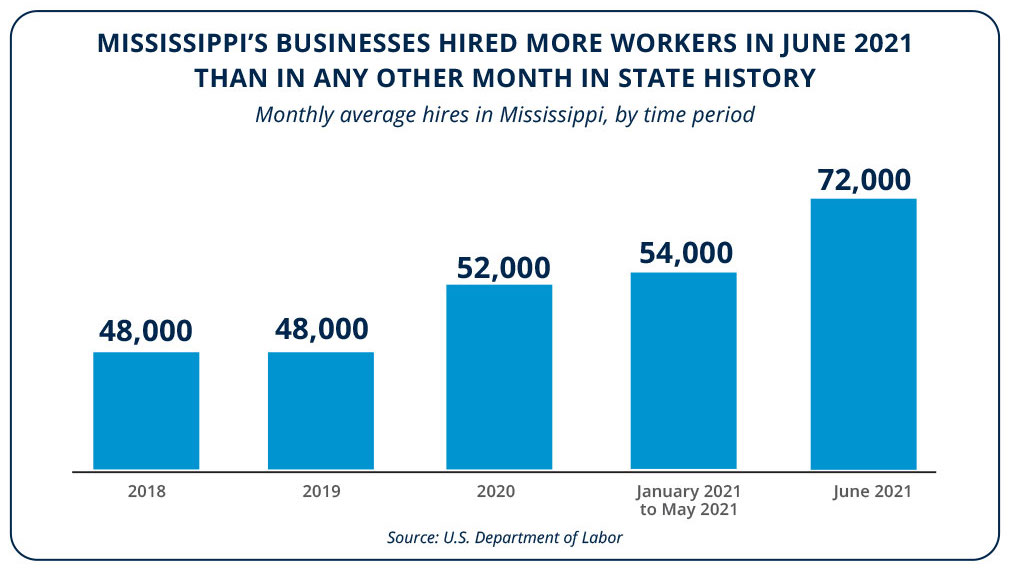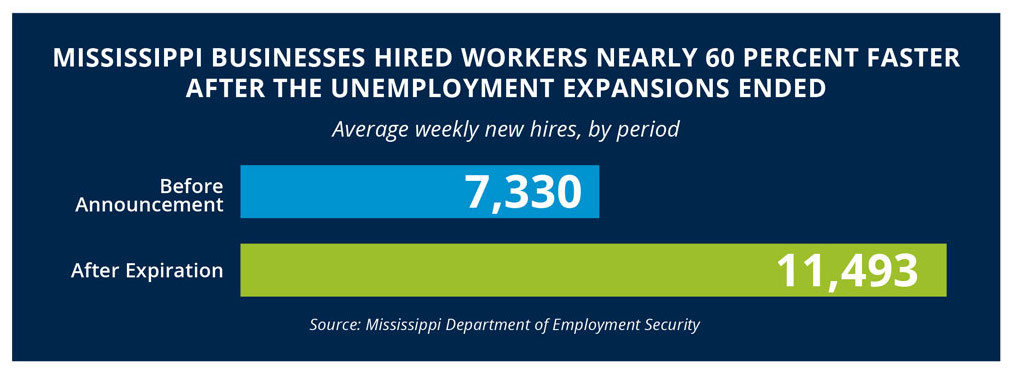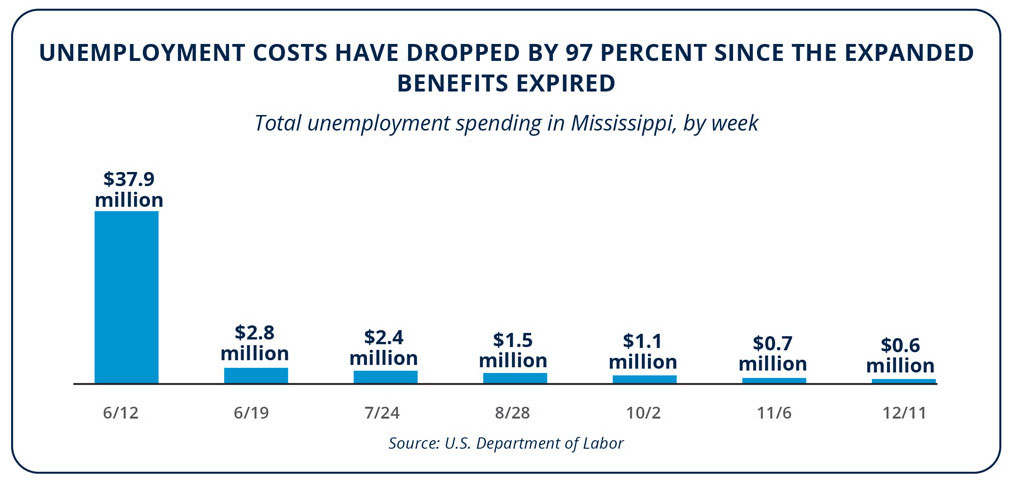How Mississippi Kicked Its Economic Comeback Into Overdrive by Ending Expanded Unemployment Benefits
KEY FINDINGS





THE BOTTOM LINE:
GOV. REEVES’S LEADERSHIP JUMPSTARTED MISSISSIPPI’S ECONOMIC COMEBACK BY ENDING THE FEDERAL UNEMPLOYMENT BONUS AND EXPANSIONS.
Overview
In early 2021, Mississippi was facing the worst labor shortage in state history. By May, Mississippi businesses had more than 84,000 open jobs across the state—a record high at the time.1See, e.g., Bureau of Labor Statistics, “Job openings and labor turnover survey: Mississippi job openings,” U.S. Department of Labor (2021), https://data.bls.gov/timeseries/JTS000000280000000JOL In fact, there were more open jobs than people looking for work.2Authors’ calculations based upon data provided by the U.S. Department of Labor on the number of unemployed individuals and the number of open jobs in Mississippi in May 2021.–3In May 2021, Mississippi employers had 84,000 open jobs. See, e.g., Bureau of Labor Statistics, “Job openings and labor turnover survey: Mississippi job openings,” U.S. Department of Labor (2021), https://data.bls.gov/timeseries/JTS000000280000000JOL–4In May 2021, Mississippi had 79,000 unemployed individuals looking for work. See, e.g., Bureau of Labor Statistics, “Local area unemployment statistics: Mississippi unemployment level,” U.S. Department of Labor (2021), https://data.bls.gov/timeseries/LASST280000000000004 Meanwhile, nearly 80,000 Mississippians were still collecting unemployment benefits—more than 10 times as many as were on the program before the pandemic hit.5Authors’ calculations based upon data provided by the Federal Reserve Bank of Atlanta on the number of continuing unemployment claims, disaggregated by program. See, e.g., Center for Workforce and Economic Opportunity, “Unemployment claims monitor,” Federal Reserve Bank of Atlanta (2022), https://www.atlantafed.org/cweo/data-tools/unemployment-claims-monitor.aspx

One major cause: Federal unemployment expansions were paying people to stay home rather than to return to work.6Hayden Dublois and Jonathan Ingram, “Paid to stay home: How the $300 weekly unemployment bonus and other benefits are stifling economic recovery,” Foundation for Government Accountability (2021), https://thefga.org/paper/unemployment-bonus-stifling-economic-recovery–7Victoria Eardley et al., “To unleash the economic recovery, Congress must fix the unemployment debacle,” Foundation for Government Accountability (2020), https://thefga.org/paper/fix-unemployment-extension–8Hayden Dublois and Jonathan Ingram, “Paid not to work: How Congress’s unemployment insurance boost hurts low-wage workers,” Foundation for Government Accountability (2020), https://thefga.org/paper/unemployment.boost-low-wage-workers–9Hayden Dublois and Jonathan Ingram, “Why any unemployment bonus would threaten America’s economic recovery,” Foundation for Government Accountability (2020), https://thefga.org/paper/unemployment-bonus.threatens-economic-recovery As a result of the unemployment bonus and other welfare expansions, individuals could collect more in taxpayer-funded benefits than the median Mississippian earned in wages at a full-time job.10Hayden Dublois and Jonathan Ingram, “Paid to stay home: How the $300 weekly unemployment bonus and other benefits are stifling economic recovery,” Foundation for Government Accountability (2021), https://thefga.org/paper/unemployment-bonus-stifling-economic-recovery

With unemployment benefits paying people to stay home, employers struggled to fill open positions. The service industry was hit the hardest, with one restaurant owner on the Mississippi coast explaining that “getting customers is no longer the issue. Now the problem is finding people who want to work.”11WLOX Staff, “Coast restaurant group offering sign-on bonus, $12 an hour for new employees,” WLOX (2021), https://www.wlox.com/2021/04/15/coast-restaurant-chain-offering-sign-on-bonus-an-hour-new-employees/
Faced with the worst labor shortage in state history, Mississippi’s leadership took swift action. On May 10, 2021, Governor Tate Reeves announced that the state was ending the federal unemployment bonus and expansions, becoming one of the first states in the nation to end these expansions early.12Tate Reeves, “It has become clear to me that we cannot have a full economic recovery until we get the thousands of available jobs in our state filled.” Twitter (2021), https://twitter.com/tatereeves/status/1391852962025201665–13Hayden Dublois and Jonathan Ingram, “Paid to stay home: How the $300 weekly unemployment bonus and other benefits are stifling economic recovery,” Foundation for Government Accountability (2021), https://thefga.org/paper/unemployment-bonus-stifling-economic-recovery As a result, the state’s economic comeback is well underway.
Mississippi Saw the Largest Hiring Spree in State History
Following Gov. Reeves’s announcement, work search activities immediately spiked throughout the state.14Authors’ calculations based upon data provided by Google on daily search interest in the term “job openings” between January 1, 2021 and June 25, 2021, relative to the highest interest level during that time period, disaggregated by month. See, e.g., Google, “Google trends,” Google (2021), http://trends.google.com/trends/explore–15Other research has used Google trends data for the term “job openings” as a proxy for aggregate job search behavior. See, e.g., Craig Garthwaite et al., “Public health insurance, labor supply, and employment lock,” National Bureau of Economic Research (2013), https://www.nber.org/system/files/working_papers/w19220/w19220.pdf–16Other states that ended pandemic-related unemployment programs saw similar spikes in work search activity. See, e.g., Jonathan Ingram and Nic Horton, “Three key signs opting out of the unemployment bonus is working,” Foundation for Government Accountability (2021), https://thefga.org/paper/three-signs-opting-out-unemployment.bonus-is-working And with more people looking for work, employers were finally able to start filling open positions. In fact, Mississippi businesses hired more than 72,000 workers in June alone— the largest hiring spree in state history.17Authors’ calculations based upon data provided by the U.S. Department of Labor on the number of new hires in Mississippi, disaggregated by month. See, e.g., Bureau of Labor Statistics, “Job openings and labor turnover survey: Mississippi hires,” U.S. Department of Labor (2021), https://data.bls.gov/timeseries/JTS000000280000000HIL Better still, that hiring spree continued throughout the summer and fall, with employers hiring more Mississippi workers between June and September than any other four-month period on record.18Authors’ calculations based upon data provided by the U.S. Department of Labor on the number of new hires in Mississippi, disaggregated by month. See, e.g., Bureau of Labor Statistics, “Job openings and labor turnover survey: Mississippi hires,” U.S. Department of Labor (2021), https://data.bls.gov/timeseries/JTS000000280000000HIL

Businesses Filled More Than 300,000 Open Jobs
Not only were employers finally able to fill open positions, but Mississippi businesses were also able to fill those positions far more quickly than before. Before Gov. Reeves’s announcement, Mississippi businesses were hiring just over 7,300 workers each week.19Authors’ calculations based upon data provided by the Mississippi Department of Employment Security on the number of new hires reported between April 5, 2021 and May 9, 2021. In the four months after the unemployment expansions ended, employers filled nearly 11,500 jobs each week—hiring at apace nearly 60 percent faster than before the announcement.20Authors’ calculations based upon data provided by the Mississippi Department of Employment Security on the number of new hires reported between June 14, 2021 and October 15, 2021.

Altogether, Mississippi businesses filled more than 300,000 jobs since Gov. Reeves ended the federal bonus and unemployment expansions.21Authors’ calculations based upon data provided by the Mississippi Department of Employment Security on the number of new hires reported between June 14, 2021 and December 17, 2021. These landmark achievements have led to more workers, booming businesses, and an economy that has been kicked into overdrive.
Unemployment Spending Dropped by 97 Percent After the Expanded Benefits Ended
When government benefits pay better than work, employers cannot find workers and taxpayers are left holding the bag. Before the federal expansions expired, taxpayers were paying roughly $38 million for unemployment benefits each week.22Authors’ calculations based upon data provided by the Mississippi Department of Employment Security on the total amount of unemployment claims paid for the week ending June 12, 2021. One week after the expanded benefits expired, these costs plummeted to just $2.8 million.23Authors’ calculations based upon data provided by the Mississippi Department of Employment Security on the total amount of unemployment claims paid for the week ending June 19, 2021. By December, unemployment costs had fallen to lessthan $600,000 per week—a drop of 97 percent since the expanded benefits expired.24Authors’ calculations based upon data provided by the Mississippi Department of Employment Security on the total amount of unemployment claims paid for the week ending December 11, 2021. Better still, Mississippi now has fewer people trapped on unemployment than at any point in state history.25Authors’ calculations based upon data provided by the U.S. Department of Labor on the number of continuing unemployment claims, disaggregated by week. See, e.g., Employment and Training Administration, “Unemployment insurance weekly claims data,” U.S. Department of Labor (2022), https://oui.doleta.gov/unemploy/claims.asp–26Prior to the pandemic, Mississippi’s record-low for continuing unemployment claims was 6,251 for the week ending October 13, 2018. Mississippi’s unemployment claims dropped below that record-low in the week ending November 6, 2021. As of the week ending December 18, 2021, unemployment claims in Mississippi have dropped to 5,490.

Thanks to Gov. Reeves’s strong leadership and quick action, Mississippi’s economy is recovering at an all-time pace and taxpayers are reaping the benefits.
THE BOTTOM LINE: Gov. Reeves’s leadership jumpstarted the economic comeback by ending the federal unemployment bonus and expansions.
By ending the federal unemployment expansions ahead of schedule, Gov. Reeves set in motion an unprecedented chain of events. Business is finally booming again, with employers filling open jobs at the fastest rate in state history. Unemployment spending has also seen a tremendous drop.
As one of the first states to opt out of the federal bonus and expansions, Mississippi deserves credit for setting the stage for other states to follow suit, and for Congress to eventually end the expansions nationwide.
